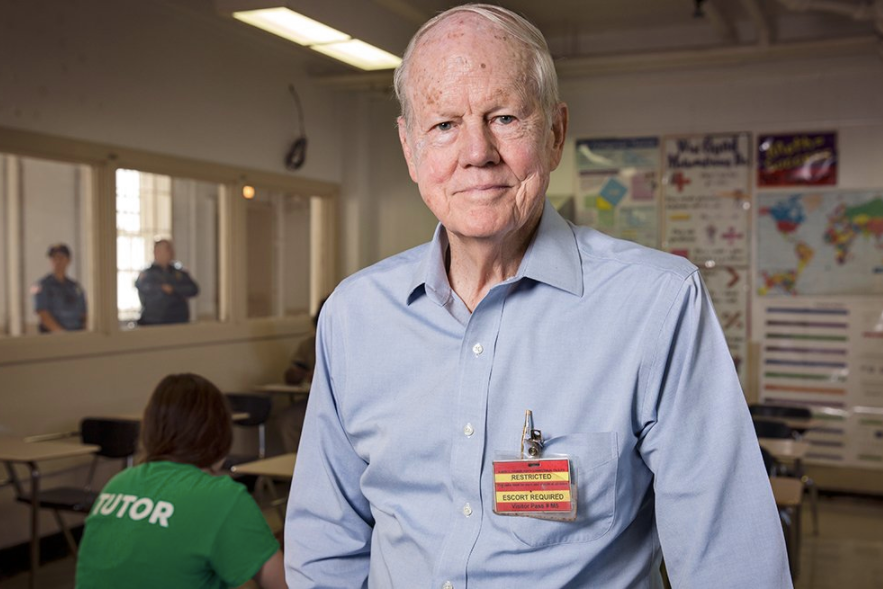Jim Farrin

Editor’s note: Jim Farrin was one of five individuals to be honored with the 2017 AARP Purpose Prize for “outstanding work by people age 50 and over that is focused on advancing social good.” Since the writing of this profile in 2014, The Petey Greene Program has grown further to include student volunteers from 30 colleges tutoring 1,500 individuals in 34 facilities.
Personal development pioneer Earl Nightingale observed that, “The more intensely we feel about an idea or a goal, the more assuredly the idea, buried deep in our subconscious, will direct us along the path to its fulfillment.” Nightingale could easily have been referring to the life of retired businessman and activist Jim Farrin ’54, whose senior college thesis explored the benefits of prisoner rehabilitation over incarceration and who today serves as executive director of the Petey Greene Prisoner Assistance Program, a nonprofit dedicated to changing the state of education in America’s correctional facilities.
A former international marketing executive, Farrin founded the program in 2007 at the request of Princeton classmate Charlie Puttkammer, who had mentored a young Washington, D.C., inmate named Petey Greene and been deeply affected by the relationship they forged. Following Greene’s release from prison, Puttkammer helped him secure a job as a radio talk show host, and several years later, when Greene interviewed Martin Luther King, he called out Puttkammer as a deeply influential figure in his own life. It was a seminal moment for Puttkammer, and years later he called Farrin and asked him to start a program at Princeton that would allow students to travel to prisons in New Jersey and teach inmates.
“When Charlie called, I told him I was too busy with my consulting work to take on the challenge,” Farrin recalls, “but the very next day, my wife spoke to the chaplain from the Albert C. Wagner Youth Correctional Facility, who said that they were desperate for volunteers to work with the inmates. I couldn’t help but see it as a sign, so I called Charlie back and told him I’d launch the program.”
Farrin contacted Princeton’s Pace Center for Civic Engagement to see if they could help him recruit students. The Center posted an ad and “within five hours, I had two responses,” Farrin recalls. “Before long, 35 students had expressed an interest in getting involved with the program.” This enthusiasm has never waned. The program currently engages nearly 300 volunteers from Princeton and four other colleges and universities in New Jersey, and the board has just completed a plan that will carry the program to New York, Boston, Philadelphia and Washington, D.C. Within five years, Farrin says, the program hopes to be active in at least 100 schools across the nation. Farrin’s belief in the power of education is unwavering, and both experience and statistics back him up. For example, studies reveal that one semester of tutoring gives inmates a boost, on average, of more than one full reading grade level. And Farrin proudly points out the achievements of former inmate Walter Fortson, who was tutored by Petey Greene volunteers. Following his release, Fortson earned a B.S. at Rutgers University, was named a Truman Scholar and pursued a master’s in criminology at the University of Cambridge. This fall he’ll return to the Petey Greene program as a staffer.
“As an executive, I lived in nine overseas countries over the course of 17 years, and I came to fully appreciate how important it is to get to know people where they are,” Farrin says. He traces this open-mindedness to his time at Exeter, and to the Academy’s philosophy of non sibi. “Exeter’s ethos is very much one of considering other people and their circumstances,” he says.“That outlook became a foundation for me and informed my time as an undergraduate at Princeton and beyond.
“I’ve always believed that life should be one-third education, one-third work and one-third giving back,” Farrin concludes. “Now that I’m in the final third of my life, giving back is my priority, and I feel incredibly fortunate to be doing so through the Petey Greene program. This is the best job I’ve ever had. Once one starts to give back and you see that you’re making a difference, it’s tremendously compelling.”
— Lori Ferguson


